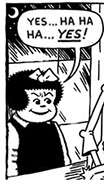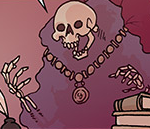|
Yawgmoth posted:Except that monks need items even more than other classes just to be not poo poo. I'm pretty sure the people who think the monk is OP don't realize this.
|
|
|
|

|
| # ? May 20, 2024 17:36 |
|
Aren't monks bad even loaded down with items?
|
|
|
|
Do they cast spells?
|
|
|
|
Kwyndig posted:Aren't monks bad even loaded down with items?
|
|
|
|
I honestly don't think I've ever actually seen a monk build go past monk level 6. You'd have to pick up some ridiculous acfs to make that anything approaching reasonable.
|
|
|
|
Kwyndig posted:Aren't monks bad even loaded down with items? Correct. Even if you hewed precisely against the item treadmill, you'd still have a problem with their BAB being a beat lower than a full martial, their Flurry of Blows being fiddly to use, their Flurry of Blows also being disadvantaged against DR (since lots-of-smaller-hits is worse than fewer-larger-hits), their MAD making them weaker than a more focused character, and the general power level problem of a non-spellcasting martial compared to any other spellcaster. The other other bold claim about Monks was that Vow of Poverty made them OP, because using unarmed attacks meant that you really could just "not own any items" ... except why not use Vow of Poverty on a Druid? or a Wizard? Those folks don't need weapons either!!!
|
|
|
|
Yeah, Vow of Poverty was another one of those "this is so broken!!!!" things that was a power downgrade 99% of the time. The other 1% of the time was on a Druid in one of those ill conceived "low magic" games where finding a +1 weapon was supposed to be a huge deal.
|
|
|
|
fool_of_sound posted:I don't think you understood my post. When the take 10 system is limited or not present, success floors matter, No they don't. If rolls are supposed to represent something where a character's success is uncertain, such as in Lady Blackbird and Burning Wheel, then a character's success should be uncertain.
|
|
|
|
senrath posted:Yeah, Vow of Poverty was another one of those "this is so broken!!!!" things that was a power downgrade 99% of the time. The other 1% of the time was on a Druid in one of those ill conceived "low magic" games where finding a +1 weapon was supposed to be a huge deal. wasn't it weird the way 'low magic' games of d&d rarely banned casters? Or rarely made adjustments for the fact higher hit dice classes don't benefit from those hit dice without having full hp? Or do anything to 'simulate' the fact your adversaries would also generally be running around at partial hp too?
|
|
|
|
Glazius posted:No they don't. If rolls are supposed to represent something where a character's success is uncertain, such as in Lady Blackbird and Burning Wheel, then a character's success should be uncertain. Uncertainty when there's a substantial chance of failure is meaningful. Failure when the chance of failure is very low is not, and it violates suspension of disbelief when a highly skilled character just randomly fucks up a task that should be easy for them on a 5% chance. Burning Wheel in particular has this problem, given the kinda strange math.
|
|
|
|
But don't most good games suggest in their gm sections only requiring rolls where there should be a chance of failure? Hell even games with shakey math like exalted 2nd e had bits about that and some of d&d 4th's dmg 2 I think also cautioned against bogging the game down with rolls and challenges that don't meaningfully contribute to the story on a success AND failure.
|
|
|
|
Coolness Averted posted:But don't most good games suggest in their gm sections only requiring rolls where there should be a chance of failure? Hell even games with shakey math like exalted 2nd e had bits about that and some of d&d 4th's dmg 2 I think also cautioned against bogging the game down with rolls and challenges that don't meaningfully contribute to the story on a success AND failure. Rolls your character should usually succeed at and story important rolls often intersect. Like, 'my character is an expert safecracker, who is known throughout the underworld for his abilities. we are in the middle of a heist, trying to crack this safe.' This is a pivotal moment in the story, and should require a roll. However, the fiction dictates that unless something weird is happening, the character should always succeed at cracking the safe. His/her 'failure' to open the safe should have an external explanation, like a guard needing to pee and walking by at a bad time, rather than 'just not skilled enough today' thanks to a bad roll. Some more modern games do this, but most still don't. I'm super tired and probably not explaining myself well, but I guess I can pose the question to whoever: what do you think dice pools do better than die+modifier? fool of sound fucked around with this message at 08:44 on Sep 30, 2018 |
|
|
|
I have no dog at all in this fight, but Burning Wheel specifically says to eyeball players' skills and never roll if they'd just do it. It has no place in this discussion unless you wanna bring up that that's kind of DM fiat. Also any fail-forward system should have this baked in. I do not understand what this has to do with baseline math. It seems to assume a lot of required rolls that only (some) D&D advises. I thought this original point was about the actual math, and this seems orthogonal to this issue. (In the same way that I could have the most loving broken math possible for my skill rolls, but it wouldn't matter because the system says I give players full successes if it's a new moon ; the jankiness or lack thereof of one has nothing to do with the other.) Also flipping coins is inherently less ergonomic than rolling d6s by the nature of how human hands work, for the most part.
|
|
|
|
fool_of_sound posted:Better to have the rules written than 'hmm yeah just make something up' This is really the opposite of true. Making a PF character if anyone else in your party is into char-op is a nightmare of analysis paralysis due to literally hundreds of feats, some of which are intentional traps and others of which are strictly superior reprints of earlier feats. Lots of content is good if that content is in any way coherent and balanced. PF, like Rifts, has gotten too big for that and relies on the GM spotting broken mechanics and vetoing them at this point.
|
|
|
|
Yawgmoth posted:You can get pretty crazy with them if you have access to all of the ACFs and are very careful with your feat choices and also get to pick several of your magic items. But man that's a lot of ifs. What's ACF?
|
|
|
|
Alternative Class Feature. You give up a class feature to get something else.
|
|
|
|
fool_of_sound posted:I'm super tired and probably not explaining myself well, but I guess I can pose the question to whoever: what do you think dice pools do better than die+modifier? Okay, firstly I hate you for tricking me into effort posting. Here I will refer to die+modifier resolution as D&D, I will be referring to the two dice pool resolution styles as BW for Burning Wheel and LB for Lady Blackbird. I will use TN for target number. Firstly, D&D. D&D has actually had a great number of resolution mechanics over the years, but they've been boiled down to the one (really two, which I will get into more in a bit) that you mentioned. Some of the benefits of this system are that it's linear which makes probability very easy to understand (as much as a human mind accurately understands probability at least). And it provides a strong sense of mechanical growth, this is directly related to the skill floor you mentioned. Now this growth is usually narrative in nature because scenario TNs are adjusted up to fit within play range. This can cause a drawback that after a certain point things that were previously a challenge are no longer any challenge at all (since they have fallen below the skill floor out of play range). (i.e. You can't fight kobolds at level 20.) Now if you compare this to BW or LB as systems you will see that they value mechanical growth much less. They are both games where growth is about exploring character identity. I actually edited a reference to this out of my initial post because I thought it was obvious, but clearly it was not. There are some LB related dice pool systems that function somewhat differently, for instance, Lasers and Feelings or Cthulhu Dark, these games usually feature no mechanical growth at all (well your roll values shift) and a fixed TN of either 0 or 1. Let's talk specifically about that other type of D&D resolution mechanic. D&D has two primary resolution mechanics challenge (the one we are discussing) and contest (Is die+modifier > die2+modifier2?). My personal view is that this second contest mechanic is much weaker than challenge, but it can generally be obviated out of existence using the take 10 concept, an example of this being 4e monster defenses replacing saves (as spells gained attack rolls in this case). From a mechanical resolution perspective 'Contest' is the form of resolution that BW is good at. (I mean, personally, I hate the rock, paper, scissors resolution in Fight!, but that's an aside) It lends itself to easier narrative interpretation, you can apply multiple types of meaningful bonuses (success, or disposition), and the end result of the contest is non-binary. The last result allows it to avoid a big drawback of D&D resolution which is the result of a series of combat challenge rolls is that one of the two parties is utterly murdered. The narrative concept of BW disposition is extremely difficult to suss out from D&D challenge resolution, to the point where I have literally never heard someone discuss it. (I'm implicitly saying that BW challenge resolution sucks compared to D&D challenge resolution. If someone else is a more ardent defender of BW, please correct me.) LB style resolution, on the other hand, had it's origins in board and chit wargaming. In this resolution each unit's is represented by a single dice. Likewise in LB and the related games, each dice (or 2 dice sometimes) represents a single narrative factor. So, in this case, the act of choosing the factors is actually the most important part of resolution because it reminds you who your character is. This is important because as Luke Crane would say the game 'revolves around it'. LB does not have skill floor/play range issues because the characters do not grow mechanically (well they do, but in general not in a way that will meaningfully affect resolution) they grow narratively. If I want to change the TN scale of gameplay (which I probably wouldn't), I just shift the narrative for all TNs and it's done. So: D&D, strong mechanical character growth BW, Disposition LB, Narrative factors Edit: Also, note that I'm implying that dice pool resolution is only a good idea for games that don't care about mechanical growth. So, anyone who wants to defend WoD, for instance, can do that separately as well. DalaranJ fucked around with this message at 17:14 on Sep 30, 2018 |
|
|
|
fool_of_sound posted:I'm super tired and probably not explaining myself well, but I guess I can pose the question to whoever: what do you think dice pools do better than die+modifier? When you roll a single die, the probability is flat. On a d20, a ten is just as likely as a one, which is just as likely as a twenty. Dice pools change the probability space and gives you an actual statistical baseline. It seems like most of the problems "take 10" rules solve are solved better by just not forcing the players to roll when failure isn't interesting. Your example of a failure being "ah well you just fudged it, sorry" doesn't really fit what we want out of a failure anyhow. A guard happening by, or maybe an unforeseen security feature of the safe activating? Much more interesting.
|
|
|
|
I do think there's an element of good lizard brain feel where you get to say "I'll take 10 on that" rather than the roll just not coming up at all, but that's pretty hard to quantify
|
|
|
|
I really donít like rolling a single dice for things, the result is always far too swingy. Iíve been moving towards playing card randomizers in my own designs because if you have a hand of cards you have a lot more control over when youíre going to do well and when youíre going to do poorly.
|
|
|
|
|
Meinberg posted:I really donít like rolling a single dice /pedant
|
|
|
|
Yawgmoth posted:That's good, because dice is the plural of die. yes, please, this is violence
|
|
|
|
Meinberg posted:I really donít like rolling a single dice for things, the result is always far too swingy. Iíve been moving towards playing card randomizers in my own designs because if you have a hand of cards you have a lot more control over when youíre going to do well and when youíre going to do poorly.
|
|
|
|
fool_of_sound posted:Rolls your character should usually succeed at and story important rolls often intersect. Like, 'my character is an expert safecracker, who is known throughout the underworld for his abilities. we are in the middle of a heist, trying to crack this safe.' This is a pivotal moment in the story, and should require a roll. However, the fiction dictates that unless something weird is happening, the character should always succeed at cracking the safe. His/her 'failure' to open the safe should have an external explanation, like a guard needing to pee and walking by at a bad time, rather than 'just not skilled enough today' thanks to a bad roll. Some more modern games do this, but most still don't. Now that I type it out I think I get where you're coming from. If someone can't roll lower than 15 then 15 is their baseline competency. They may fail because the DC ("external factors") was too high but they can still say they did a competent job, but it's possible in a dice pool system to roll all failures which is arguably harder to spin as factors outside your character's control. In practice though whenever I've seen someone roll a 1 or a 2 on a d20 it's rarely described as "You did good but not good enough" and usually "You did a bad job at this thing" no matter what the modifier was. Splicer fucked around with this message at 21:09 on Sep 30, 2018 |
|
|
|
Dr Cheeto posted:When you roll a single die, the probability is flat. On a d20, a ten is just as likely as a one, which is just as likely as a twenty. Dice pools change the probability space and gives you an actual statistical baseline. I'd say the main benefit of dice pool systems is that they better lend themselves to tiered success, and I really like tiered success systems. They also tend to be a bit better on the "I should have rolled (better skill)" problem, since with dice+mod if you have a skill with a higher mod you can immediately see that if you'd been adding the better mod you'd have succeeded, while with a dice pool system there's no way to tell what the unrolled dice would have been. Splicer fucked around with this message at 21:14 on Sep 30, 2018 |
|
|
|
Splicer posted:Now that I type it out I think I get where you're coming from. If someone can't roll lower than 15 then 15 is their baseline competency. They may fail because the DC ("external factors") was too high but they can still say they did a competent job, but it's possible in a dice pool system to roll all failures which is arguably harder to spin as factors outside your character's control. In practice though whenever I've seen someone roll a 1 or a 2 on a d20 it's rarely described as "You did good but not good enough" and usually "You did a bad job at this thing" no matter what the modifier was. Yeah this is basically what I mean, but I get where other people are coming from on this.
|
|
|
|
fool_of_sound posted:Yeah this is basically what I mean, but I get where other people are coming from on this. The FFG funny dice are a dice pool that avoids the problem you're talking about because the odds of rolling absolutely no beneficial results before subtracting the difficulty die results are incredibly low. You can still end up with no positive results but that will almost certainly be due to subtracting the difficulty dice results, the "external factors", from your positive results.
|
|
|
|
Ghost Leviathan posted:Engine Hearts...
|
|
|
|
Kai Tave posted:Did they at least get a refund? It was supposed to be dmed by one of their cousins so I think they never paid since it never got going. Hell I would dm for them if I had any time at all
|
|
|
|
All this "but my character would never fail at something this simple" stuff is so easily remedied just by referring to the opposite of a success as a twist. You didn't necessarily fail at the task, but something bad happened and maybe it was your fault and maybe it wasn't. If you take anything from Strike!, take that, please. (Edit to say that I totally took it from Mouse Guard - not trying to claim it as my original idea.) Jimbozig fucked around with this message at 22:49 on Sep 30, 2018 |
|
|
|
Jimbozig posted:All this "but my character would never fail at something this simple" stuff is so easily remedied just by referring to the opposite of a success as a twist. You didn't necessarily fail at the task, but something bad happened and maybe it was your fault and maybe it wasn't. Yeah, when the system call for this and gives advice about how to render failure like this, that's superior. Most systems still don't have that though.
|
|
|
|
Yeah, as others have said, this is less a problem with how you roll your dice, more a problem with it being a binary pass/fail result. If the world class safe cracker whiffs his roll, the safe is still opening, but there's just one more alarm those miserable bastards set where even the safe cracker hadn't thought to look.
|
|
|
|
Jimbozig posted:All this "but my character would never fail at something this simple" stuff is so easily remedied just by referring to the opposite of a success as a twist. You didn't necessarily fail at the task, but something bad happened and maybe it was your fault and maybe it wasn't. Yeah, one potentially helpful way to reframe the issue is to think of rolls not as representing how good you are at thing, but how likely it is that being good at thing will benefit you rather than complicate your life further. So if your character sheet says you're an expert archer, you're always going to do an expert job at archery in the absence of some specific factor impairing you, but you roll to see whether the circumstances are such that being an expert archer is what it takes to solve your current problem. Off the top of my head, Vincent Baker's experimental game Rock of Tahamaat states explicitly that this is what your stats mean, and I think there are a lot of other narrative-leaning games where it makes more sense to look at them that way as well. It's mostly appropriate for games where rolls operate on a wider scope than "do I hit this guy right now", though. Thuryl fucked around with this message at 23:23 on Sep 30, 2018 |
|
|
|
Burning Wheel's advancement is tied to doing rolls so it doesn't fit well with auto-successes. I think. It's really hard to tell whats going on with those rules.
|
|
|
|
https://twitter.com/machineiv/status/1046556014156296193
|
|
|
|
fool_of_sound posted:Yeah, when the system call for this and gives advice about how to render failure like this, that's superior. Most systems still don't have that though. Lady Blackbird and Burning Wheel both do, though? Failure means an escalation in Lady Blackbird and Burning Wheel has the twist-or-condition rider. In fact, a lot of systems do, whether the system is a task-resolution system where safecracking takes up a unit of time and the GM will advance patrols or make an encounter check before you get to do it again, or a story-resolution system where safecracking determines where the story goes and, success or failure, it somehow advances it. The only systems that don't are the ones that got caught halfway between frameworked task-resolution and freeform story-resolution, and try to have task-resolution procedures in a freeform environment with some kind of flimsy patch on top like "when you fail cracking a safe you can never try again because reasons". So basically... later-edition D&D and the majority of commercial RPGs that copied it.
|
|
|
|
Anybody in here have a recommendation for a reliable automatic playing card shuffler (preferably with a built in shoe or something similar)? Some older friends have trouble with their hands and are now having a tough time shuffling and dealing regular playing cards.
|
|
|
|
 New blogpost for The Next Project is up! New blogpost for The Next Project is up! This time, I'm talking about the structure of powers, rider effects, and action economy just a little bit. This is mainly what I would call a "brainstorming" post, effectively discussing some of the merits to how both 4th Edition and 5th Edition D&D handle these things 4e did it better; be like 4e. If you're interested in talking about the game's designs, all goons are invited to join the TNP Discord.
|
|
|
|
Wrestlepig posted:Burning Wheel's advancement is tied to doing rolls so it doesn't fit well with auto-successes. I think. It's really hard to tell whats going on with those rules. Yeah, this is something I didn't want to nitpick in one of the posts above because it's a bit of a derail. In BW, you never give auto-success because the character is too good at a task to have a chance of failure. You give auto-success at a task when the success or failure of the task doesn't matter to any character's beliefs or to the ongoing story (which should also serve to challenge a player's beliefs). So if a player wants to do something hard but irrelevant to everything in the story just to try get a test for advancement, you just say "ok, you did it, great." And if a player wants to do something really easy but that is relevant to their beliefs, then they have to roll. However, that second scenario shouldn't happen too often because if a player has a belief about something, the GM is supposed to challenge that belief, and part of challenging it is not making things too easy. So there will be some easy rolls, but also lots of hard and moderately hard ones. It's hard to get how all this stuff fits together and works in play on a first read of the book. I picked it up from the old BW forums before they closed down. The Adventure Burner helps a lot, too.
|
|
|
|

|
| # ? May 20, 2024 17:36 |
|
Joke I missed from ages back: maybe the Dragonborn named Blue has a blue tongue.
|
|
|
































